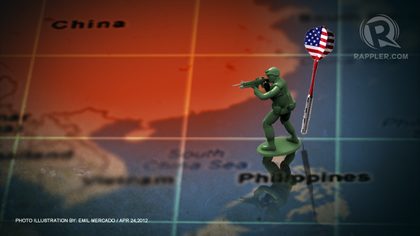SUMMARY
This is AI generated summarization, which may have errors. For context, always refer to the full article.

MANILA, Philippines – The United States’ influence in countries with territorial claims in the South China Sea has convinced Chinese leaders of the value of a “moderate” stance toward these disputes, an international think-tank said. But internal politics and the conflicting interests of its power players are making it difficult for China to exercise this.
An organization working to prevent conflict worldwide, the International Crisis Group (ICG) reported this in a paper published Monday, April 23, when the Scarborough Shoal standoff was about to enter its 3rd week.
Certainly, the US is not the deciding factor for China’s assertion of claims over portions of, or the whole, South China Sea. Domestic factors also come into play, according to the ICG report titled “Stirring Up the South China Sea.”
The South China Sea issue, however, came to the “direct attention” of China’s leadership due to “the perception the US has been taking advantage of the situation to strengthen its presence and its alliances in the region.”
The ICG said the shift in China’s policy began in 2010, when US Secretary of State Hillary Clinton re-affirmed that US national interests include freedom of navigation in the South China Sea. China then began to aim to discourage US involvement and the internationalization of disputes in the area, the think-tank said.
China fears Asean countries “have been using the US as a hedge to counter-balance its growing power, and Washington has been using them to expand its regional presence,” explained ICG.
It said, “This prompted Beijing to adopt a more moderate approach in mid-2011 to defuse regional tensions.”
Moderate?
The ICG said China, for instance, engaged in a high-level diplomatic outreach in the Asean region, helping calm the “war of words.” It also deepened its political relationship with Vietnam, with which it has one of its thorniest regional bilateral relationships.
ICG said China even went as far as saying it would present a territorial claim based on the United Nations Convention on the Law of the Sea (Unclos). Unclos is the UN convention governing maritime affairs, which the Philippines cites in contrast to China’s historical claim over the waters surrounding Scarborough Shoal. (Read: Scarborough Shoal according to Manila, Beijing.)
Some Chinese statements on the Scarborough Shoal dispute, however, seem to be far from moderate.
An editorial published by the Global Times, a tabloid owned by the ruling Communist Party, is pushing for a “small-scale war” against the Philippines over the dispute.
Earlier this week, the Philippines also found out Chinese ships remained in the disputed territory despite China’s claim only one of its ships stayed there.
Domestic problems
What is hampering China’s moderate response to South China Sea issues, ICG explained, is a host of domestic problems. (More in the report below)
“The conflicting mandates and lack of coordination among Chinese government agencies, many of which strive to increase their power and budget, have stoked tensions in the South China Sea,” the ICG said.
China’s Foreign Ministry, for one, lacks the power to manage other concerned government agencies. The Chinese Navy also uses the tensions to justify its modernization, while national sentiments compound the issue, according to the ICG.
“Internally, China has taken measures to calm nationalist sentiment and discourage aggressive actions by local agencies. However, China’s current approach remains characterised by numerous ministerial level actors and law enforcement agencies with no effective coordinating authority and no high-level long-term policy,” the ICG said.
“Ultimately, the ability to manage relations in the South China Sea and resolve disputes will present a major test of China’s peaceful rise,” the think-tank added.
Politically motivated?
On Monday, a Philippine senator himself warned Filipinos against turning into “unwitting pawns in what could possibly be a politically motivated show of force of China in their excursions into the Scarborough Shoal.”
“We must tread very carefully. China is currently embroiled in a leadership scandal at the highest levels of the Communist Party. The current tension in the West Philippine Sea could become a very convenient diversion by fanning the flames of nationalist fanaticism in China,” Sen Francis Pangilinan said.
“We should not allow ourselves to become scapegoats in a brewing internal controversy,” Pangilinan added.
President Benigno Aquino III, however, is taking no chances.
In an interview with reporters Tuesday, Aquino said the Philippines’ will wield its best “weapon” in the ongoing dispute: “for the world to know what is being done to us.”
“They have relations with other nations around the world which would make other nations think, if we are being treated this way… there might come a time when they would also be treated the same way,” Aquino said.
Entering its 3rd week, the Scarborough Shoal dispute is almost back to square one after Philippine authorities monitored at least 7 remaining Chinese vessels there as of Monday evening. – Rappler.com
Add a comment
How does this make you feel?
There are no comments yet. Add your comment to start the conversation.